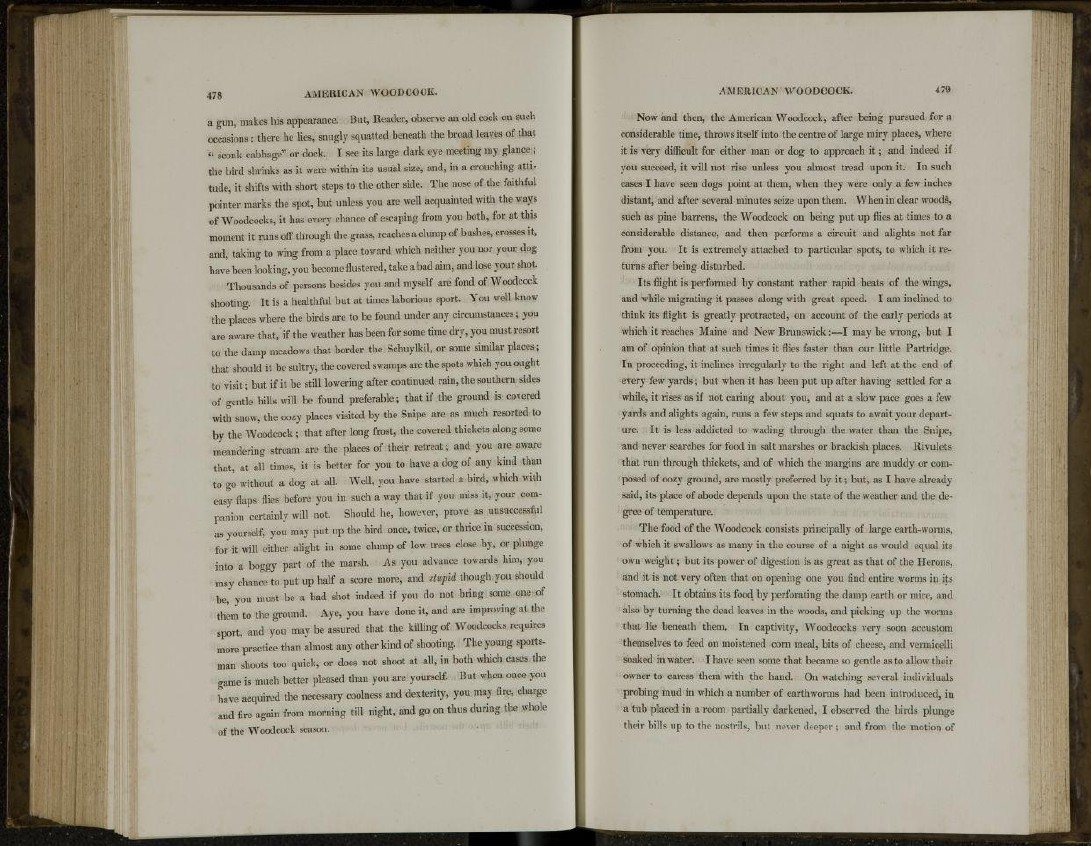
a gun, makes his appearance. But, Reader, observe an old cock on such
occasions : there he lies, snugly squatted beneath the broad leaves of that
" sconk cabbage"" or dock. I see its large dark eye meeting my glance ;
the bird shrinks as it were within its usual size, and, in a crouching attitude,
it shifts with short steps to the other side. The nose of the faithful
pointer marks the spot, but unless you are well acquainted with the ways
of Woodcocks, it has every chance of escaping from you both, for at this
moment it runs off through the grass, reaches a clump of bushes, crosses it,
and, taking to wing from a place toward which neither you nor your dog
have been looking, you become flustered, take a bad aim, and lose your shot.
Thousands of persons besides you and myself are fond of Woodcock
shooting. It is a healthful but at times laborious sport. You well know
the places where the birds are to be found under any circumstances; you
are aware that, if the weather has been for some time dry, you must resort
to the damp meadows that border the Schuylkil, or some similar places;
that should it be sultry, the covered swamps are the spots which you ought
to visit; but if it be still lowering after continued rain, the southern sides
of gentle hills will be found preferable; that if the ground is covered
with snow, the oozy places visited by the Snipe are as much resorted to
by the Woodcock ; that after long frost, the covered thickets along some
meandering stream are the places of their retreat; and you are aware
that, at all times, it is better for you to have a dog of any kind than
to go without a dog at all. Well, you have started a bird, which with
easy flaps flies before you in such a way that if you miss it, your companion
certainly will not. Should he, however, prove as unsuccessful
as yourself, you may put up the bird once, twice, or thrice in succession,
for it will either alight in some clump of low trees close by, or plunge
into a boggy part of the marsh. As you advance towards him, you
may chance to put up half a score more, and stupid though you should
be, you must be a bad shot indeed if you do not bring some one of
them to the ground. Aye, you have done it, and are improving at the
sport, and you may be assured that the killing of Woodcocks requires
more practice than almost any other kind of shooting. The young sportsman
shoots too quick, or does not shoot at all, in both which cases the
game is much better pleased than you are yourself. But when once you
have acquired the necessary coolness and dexterity, you may fire, charge
and fire again from morning till night, and go on thus during the whole
of the Woodcock season.
Now and then, the American Woodcock, after being pursued for a
considerable time, throws itself into the centre of large miry places, where
it is very difficult for either man or dog to approach i t ; and indeed if
you succeed, it will not rise unless you almost tread upon it. In such
cases I have seen dogs point at them, when they were only a few inches
distant, and after several minutes seize upon them. When in clear woods,
such as pine barrens, the Woodcock on being put up flies at times to a
considerable distance, and then performs a circuit and alights not far
from you. It is extremely attached to particular spots, to which it returns
after being disturbed.
Its flight is performed by constant rather rapid beats of the wings,
and while migrating it passes along with great speed. I am inclined to
think its flight is greatly protracted, on account of the early periods at
which it reaches Maine and New Brunswick:—I may be wrong, but I
am of opinion that at such times it flies faster than our little Partridge.
In proceeding, it inclines irregularly to the right and left at the end of
every few yards; but when it has been put up after having settled for a
while, it rises as if not caring about you, and at a slow pace goes a few
yards and alights again, runs a few steps and squats to await your departure.
It is less addicted to wading through the water than the Snipe,
and never searches for food in salt marshes or brackish places. Rivulets
that run through thickets, and of which the margins are muddy or composed
of oozy ground, are mostly preferred by it; but, as I have already
said, its place of abode depends upon the state of the weather and the degree
of temperature.
The food of the Woodcock consists principally of large earth-worms,
of which it swallows as many in the course of a night as would equal its
own weight; but its power of digestion is as great as that of the Herons,
and it is not very often that on opening one you find entire worms in its
stomach. It obtains its food by perforating the damp earth or mire, and
also by turning the dead leaves in the woods, and picking up the worms
that lie beneath them. In captivity, Woodcocks very soon accustom
themselves to feed on moistened corn meal, bits of cheese, and vermicelli
soaked in water. I have seen some that became so gentle as to allow their
owner to caress them with the hand. On watching several individuals
probing mud in which a number of earthworms had been introduced, in
a tub placed in a room partially darkened, I observed the birds plunge
their bills up to the nostrils, but never deeper ; and from the motion of